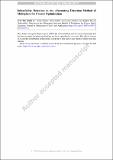Infeasibility Detection in the Alternating Direction Method of Multipliers for Convex Optimization
Author(s)
Banjac, Goran; Goulart, Paul; Stellato, Bartolomeo; Boyd, Stephen
Download10957_2019_1575_ReferencePDF.pdf (398.3Kb)
Publisher Policy
Publisher Policy
Article is made available in accordance with the publisher's policy and may be subject to US copyright law. Please refer to the publisher's site for terms of use.
Terms of use
Metadata
Show full item recordAbstract
Abstract
The alternating direction method of multipliers is a powerful operator splitting technique for solving structured optimization problems. For convex optimization problems, it is well known that the algorithm generates iterates that converge to a solution, provided that it exists. If a solution does not exist, then the iterates diverge. Nevertheless, we show that they yield conclusive information regarding problem infeasibility for optimization problems with linear or quadratic objective functions and conic constraints, which includes quadratic, second-order cone, and semidefinite programs. In particular, we show that in the limit the iterates either satisfy a set of first-order optimality conditions or produce a certificate of either primal or dual infeasibility. Based on these results, we propose termination criteria for detecting primal and dual infeasibility.
Date issued
2019-08-13Department
Massachusetts Institute of Technology. Operations Research CenterPublisher
Springer US